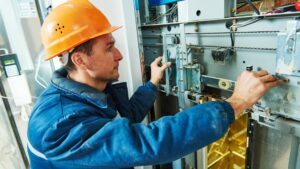
Elevator mechanics play an important role in improving the accessibility of buildings. They install, maintain, and repair elevators and/or other vertical transportation systems. Despite the important tasks you have as an elevator mechanic, the nature of your work will expose you to different hazards. Some of these include fall risks, electrical burns, muscle sprains, and the risk of entrapment or engulfment when working in confined spaces.
The good news is that there are various safety tips you can use to protect yourself from serious injuries or fatal accidents. Here are the top five:
1. Learn About Safety
One of the top ways to guarantee your safety when working on elevators and similar systems is to ensure you have a proper understanding of what you should and shouldn’t do. A top-rated elevator course from a reputable professional education provider like RocketCert will familiarise you with different matters of safety around elevator installation, repairs, and other services.
Such a course can make all the difference when it comes to understanding how to keep yourself and other workers safe. You can also consider taking safety-focused courses like OSHA training to enhance your understanding of the best workplace safety practices.
2. Use the Right Fall Protection Setup
Your work as an elevator mechanic will involve working at heights or in open elevator shafts, and such conditions come with a heightened risk of falling. In truth, falls account for approximately half of the fatalities involving workers in or near elevator shafts. This goes to show how important it is to use the appropriate fall protection setup when working in such environments.
Some of the top safety measures to consider are:
- Complete fall arrest systems, including full-body harnesses
- Guardrails and barriers
- Safe ladders and platforms
- Proper scaffolding
- In-depth training on fall protection equipment
3. Take Precautions Around Electrical Systems
You may have to work with live electrical circuits and systems as a mechanic, and this can put you at risk of various electrical injuries such as shocks, electrocution, and burns. It’s crucial, therefore, to take proper precautions such as using PPE for electrical work, grounding systems, using insulated tools, leveraging Lockout/Tagout (LOTO) procedures, and inspecting equipment regularly.
4. Protect Yourself Against Mechanical Hazards
Elevator systems have many moving parts, such as pulleys, gears, cables, and others that can pose mechanical hazards. Accidents in this category typically lead to amputations, crushing injuries, and even fatalities.

Make sure to protect yourself against these eventualities by ensuring the elevator system is completely shut down and secured, having the required PPE such as safety helmets and steel-toed boots, leveraging clear communication, and machine guarding.
5. Work in Properly Ventilated Areas With Safe Entry
Elevator mechanics typically work in confined spaces, which come with different hazards like oxygen deficiency, poor ventilation, and the risk of entrapment. Working in such environments requires a couple of special safety precautions. Some of the most important include:
- Entering confined spaces only after proper authorisation and permits
- Testing for toxic gases and oxygen levels before entry
- Using portable ventilation systems
- Designing an emergency rescue plan
- Ensuring effective communication with the team members outside the confined space
Take Action to Understand Elevator Mechanic Safety Better
Whether you are just getting into elevator installation and maintenance or you already have several years of experience, the tips mentioned in this post will go a long way towards keeping you safe at work. Also, always engage your employer or clients in conversations about your safety and that of your colleagues, where necessary.
Most importantly, equip yourself with the right information about safety by taking an elevator course from rocketcert.com. This course will go deeper into what you should know, not only to stay safe at work but also to be more effective at what you do.
